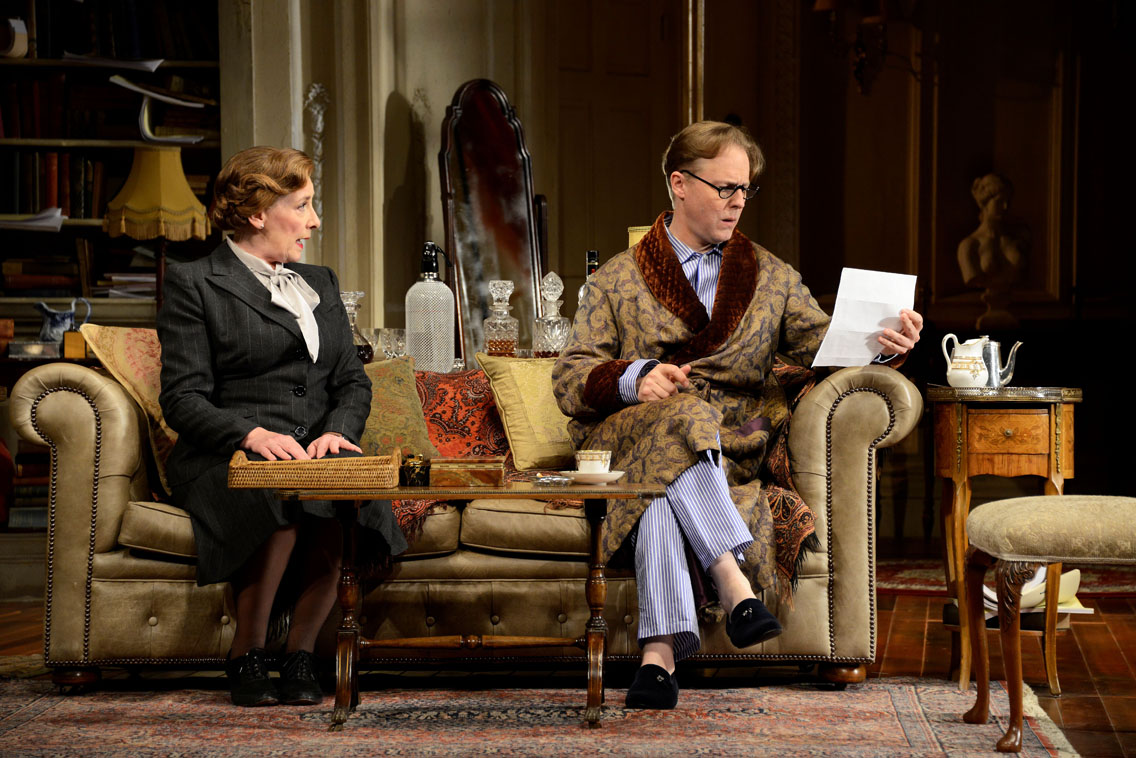
Physicists tell us of an annoying hiss that was discovered by researchers tinkering with a radio telescope in the middle of the last century. The troublesome noise turned out to be a Nobel winning echo from the beginning of the universe. I was reminded of this messenger from the past (part of the static on a blank TV screen) during last night’s performance of Present Laughter. I wondered how something so apparently trivial and superficial could have helped establish such a glittering reputation as Coward’s.
In his early years Coward was a tilter at convention. He was writing in an age in which fidelity was the cross that broken marriages had to bear. An age in which the term, ‘confirmed bachelor’ was the kind of phrase used to describe him and others such as Rattigan, Novello and Gielgud. Even today the term ‘homosexual’ conveys a faint whiff of tart disapproval, unlike the more benign, ‘gay’ which sits on the spectrum of life’s great rich pattern. In short, in 1941/2 his ‘sort’ had to watch it.
The title of the play comes from Twelfth Night, the full quote being:
What is love, ‘tis not hereafter
Present mirth hath present laughter:
What’s to come is still unsure.
In delay there lies no plenty’
Then come kiss me, sweet and twenty:
Youth’s a stuff will not endure.
In other words Carpe Diem, or as we say today, ‘Life’s too short’ (to worry about conventional morality.) For the perennially puckish Coward the semi-autobiographical Garry Essendine carries a healthy dollop of self-mockery as the self-obsessed and vain, romantic comedy actor for whom ‘time’s winged chariot’ was clattering painfully close. Essendine is making the most of his celebrity attraction by entertaining a series of women who have ‘lost their latchkey’ and thrown themselves on his late night hospitality – much to the disapproval of his secretary and estranged wife, who nevertheless object not on the grounds of immorality, but the more practical consideration of the effect revelations would have on the family business (Garry’s stage career). They also think it about time he grew up. Such behaviour today would garner little more than a ‘so what’ as ‘kiss and tell’ magazines and ‘newspaper’ stories struggle to generate feigned disapproval of the commonplace and unremarkable. Coward’s carefully calibrated undermining of convention was not so easily dismissed back in the day and reaction to his playing fast and loose with the mores of the time met with a mixed reaction; taboos are after all taboo. (Hence my recollection of the background hiss – of the way we were). Other critics have argued that of course that was part of Coward’s appeal – we British what are we like?
A notable feature of the play is that all the women give as good as, if not better than they get. Even the young, star-struck Daphne (Daisy Boulton) is not to be deflected from what she (unrealistically in her case) wants. Phyllis Logan as Monica, the secretary, eschews glamour for being the unflappable fixer, worldly-wise and tolerant, patient, unthreateningly angular and efficient. Yet even in her sensible working tweeds she hints at a private, emotional life outside the flim-flam of Essendine’s studio. Joanna Lyppiatt (Zoe Boyle) is the mistress of her sex and not the victim of it. Her irresistible sexuality is controlled and thoughtful, used to further her own emotional needs. No pawn she in the machinations of men. Likewise Rebecca Johnson, who as Liz Essendine, has the measure of her estranged husband and knows him better than he knows himself (not unlike Monica who knows him ‘less intimately than some, but better than most’).
Samuel West swishes around the stage, comfortably at home in a silk dressing gown. Under Stephen Unwin’s direction he keeps the play bubbling along, never letting the ball drop in the perpetual, sophisticated, verbal tennis that characterizes a Coward play. Mr West shows us a light touch without being vapid. Full of his own self-importance, with just enough self-doubt to keep him human, the attitudes and poses are all characteristically and recognizably Coward.
Simon Higlett’s set is as good an example as you will find of an elegant yet comfortable and characterful studio flat. The supporting cast all add their own touch of gloss to a show which does great service to the wit of ‘The Master’ and has that elusive quality of ‘style’. ★★★★☆ Graham Wyles at Bath Theatre Royal on 29th June 2016
Photo by Nobby Clark

